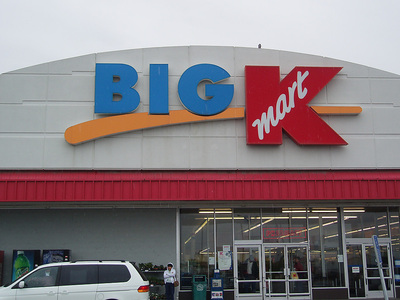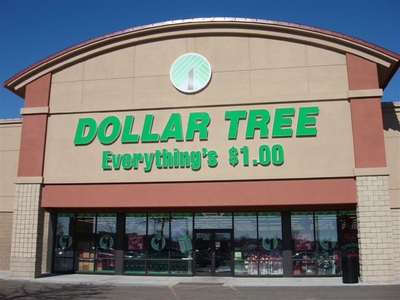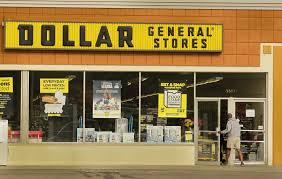|
There is nothing more American than Walmart, a mega-store filled with your every need and want. Sure their employees are underpaid and most of their wares end up in the garbage, but for just one hour you can be supremely entertained immersed in a carnival commerce. It's like an amusement park for capitalism and consumerism, where an adult comes alive, like a child in a candy store. Otherwise known as the Supercentre, Big Box Store, and Super Store these places have coined their last name as "category killer" by basically eliminating the quint essential mom and pop store. There are now fewer and fewer butchers, baker, and candle stick makers, replaced by big business.
This uncontrollable spiral of conspicuous consumption starts as an empty carton of milk, transpiring into a quick trip to the grocery store. Walking down the isles of some mega-store you'll think of how creative or un-creative you are, where influenced by merchandise you'll soon adopt new hobbies such as archery, scrap-booking, beading, and quilting only to never touch the stuff again. Then as a result of advertising and a need for newness you confronted with the the fact your appliances have never seemed more outdated. Like upgrading your computer software, you can update your stuff to satisfy desires you never knew existed. So by modernizing your appliances from the hair dryer to your sprinkler systems and George Foreman grill, you can rest assured you'll fit in. Now if you're traveling with children their incessant need for everything will become apparent, soon enough toys and clothing won't cut it and you'll have your 5 year old pointing at a box of condoms or tampons going "gimme." Ultimately you end up with a cart full of crap, have acquired everything but an aquarium full of fish. It's like you're end goal was to see how much money you could spend or rather save (wink wink) in an hour. If only you had stuck to the grocery isles, you would have potato sacks full of chips and a lifetime rice from the ethnic aisle. If Walmart's breadth is too wide and you're nostalgic for a category why not pick outdoors such as Bass Pro Shop. Sure Walmart carries camping equipment, but BPS has variety. You never knew there were hundreds of sleeping bags to choose from, nor that a mini-handgun existed in Breast Cancer awareness pink. If the great outdoors isn't for you, maybe the organizing the indoors better suits you. At the Container Store you'll find discover a new realm of Tupperware, organizers for the organizer. For the consumer who's too cheap for Walmart, there's always the dollar store. While the Dollar Tree's philosophy is keeping it real cheap, you'll discover there are things there more than a buck. Big Lots, T.J. Maxx and Marshall's theory is to buy from a variety of vendors, boutiques, brands, manufactures, store cancellations and store closures. They're essentially the bottom feeders of mega-stores and although unpredictable, they add the element of competition and surprise to the mega-store amusement park. It seems as though even the drug stores are getting into the super-center game where in addition to fill prescriptions and giving flu shots, you can get groceries along the way. While seemingly convenient, most of Europe and the rest of the world still operate in the old way, where they know their local fish monger by name and their baker comes to their holiday party. As the saying goes, too much of anything is bad and if you go without it, you're more likely to appreciate it. So if you're somewhere in suburbia and the only fun thing to do is to hop on the Walmart Supercentre roller coaster take a look at the admission price, as in some instances bigger isn't always better.
0 Comments
Leave a Reply. |
LAJ
100 Objects of Popular and Material Culture is an blog exploring the manifestations of human consumption and commodity-ization. The purpose of this experiment is to explore material and popular culture in contemporary society by using objects and concepts to prompt wider questions and reflections. So by emulating The British Museum's and Neil MacGregor's format of A History of the World in 100 Objects I plan to satirically analyze and reinterpreted 100 material culture objects over the course of 2014. Material Culture is the study of our culture's consumption of stuff; namely the manifestation of culture through material productions where people's perceptions of objects is socially and culturally dependent. With this, objects reflect conscious and unconscious beliefs on the the individuals who fabricated, purchased, or used them, and by extension the society where they live. So examining materiality, cultural truths and societal assumptions may be discovered. As anthropologist Arjun Appaduai states "in any society the individual is often caught between the cultural structure of commodity-ization and his own personal attempts to bring a value and order to the universe of things." Objects and commodities make up a much larger symbolic system consisting of want and need, socio-economic status, fashion, etc. Often times form follows function whether the commodity, market, and or consumer forever evolve around one-another. Philosopher Pierre Bourdieu's theories of capital flow full circle; where regardless if you are a minimalist or a hoarder the world is made up of things and everyone will leave their footprint on the earth. So by humorously analyzing marketed objects and concepts, hopefully this blog will provide further incite into ideas of over-consumption, a disposable society, consumerism vs. anti-consumers, planned obsolescence vs. sustainability, as well as the greater good of mankind and future generations. Archives
March 2015
Categories |






 RSS Feed
RSS Feed